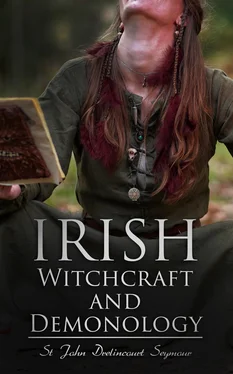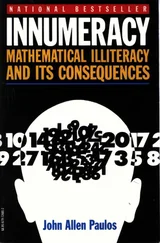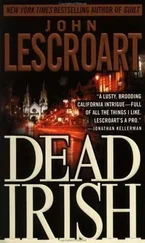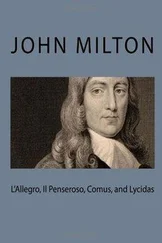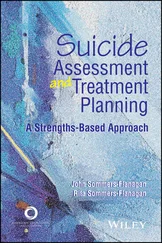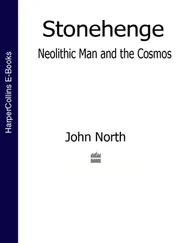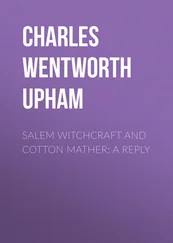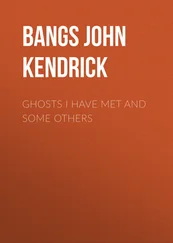St John Drelincourt Seymour - Irish Witchcraft and Demonology
Здесь есть возможность читать онлайн «St John Drelincourt Seymour - Irish Witchcraft and Demonology» — ознакомительный отрывок электронной книги совершенно бесплатно, а после прочтения отрывка купить полную версию. В некоторых случаях можно слушать аудио, скачать через торрент в формате fb2 и присутствует краткое содержание. Жанр: unrecognised, на английском языке. Описание произведения, (предисловие) а так же отзывы посетителей доступны на портале библиотеки ЛибКат.
- Название:Irish Witchcraft and Demonology
- Автор:
- Жанр:
- Год:неизвестен
- ISBN:нет данных
- Рейтинг книги:4 / 5. Голосов: 1
-
Избранное:Добавить в избранное
- Отзывы:
-
Ваша оценка:
- 80
- 1
- 2
- 3
- 4
- 5
Irish Witchcraft and Demonology: краткое содержание, описание и аннотация
Предлагаем к чтению аннотацию, описание, краткое содержание или предисловие (зависит от того, что написал сам автор книги «Irish Witchcraft and Demonology»). Если вы не нашли необходимую информацию о книге — напишите в комментариях, мы постараемся отыскать её.
Irish Witchcraft and Demonology — читать онлайн ознакомительный отрывок
Ниже представлен текст книги, разбитый по страницам. Система сохранения места последней прочитанной страницы, позволяет с удобством читать онлайн бесплатно книгу «Irish Witchcraft and Demonology», без необходимости каждый раз заново искать на чём Вы остановились. Поставьте закладку, и сможете в любой момент перейти на страницу, на которой закончили чтение.
Интервал:
Закладка:
St John Drelincourt Seymour
Irish Witchcraft and Demonology
e-artnow, 2021
Contact: info@e-artnow.org
EAN: 4066338128805
Table of Contents
Chapter I
Chapter II
Chapter III
Chapter IV
Chapter V
Chapter VI
Chapter VII
Chapter VIII
Chapter IX
CHAPTER I
Table of Contents
Some Remarks on Witchcraft in Ireland
It is said, though we cannot vouch for the accuracy of the statement, that in a certain book on the natural history of Ireland there occurs a remarkable and oft-quoted chapter on Snakes—the said chapter consisting of the words, “There are no snakes in Ireland.” In the opinion of most people at the present day a book on Witchcraft in Ireland would be of equal length and similarly worded, except for the inclusion of the Kyteler case in the town of Kilkenny in the first half of the fourteenth century. For, with the exception of that classic incident, modern writers seem to hold that the witch-cult never found a home in Ireland as it did elsewhere. For example, the article on “Witchcraft” in the latest edition of the Encyclopædia Britannica mentions England and Scotland, then passes on to the Continent, and altogether ignores this country; and this is, in general, the attitude adopted by writers on the subject. In view of this it seems very strange that no one has attempted to show why the Green Isle was so especially favoured above the rest of the civilised world, or how it was that it alone escaped the contracting of a disease that not for years but for centuries had infected Europe to the core. As it happens they may spare themselves the labour of seeking for an explanation of Ireland’s exemption, for we hope to show that the belief in witchcraft reached the country, and took a fairly firm hold there, though by no means to the extent that it did in Scotland and England. The subject has never been treated of fully before, though isolated notices may be found here and there; this book, however imperfect it may be, can fairly claim to be the first attempt to collect the scattered stories and records of witchcraft in Ireland from many out-of-the-way sources, and to present them when collected in a concise and palatable form. Although the volume may furnish little or nothing new to the history or psychology of witchcraft in general, yet it may also claim to be an unwritten chapter in Irish history, and to show that in this respect a considerable portion of our country fell into line with the rest of Europe.
At the outset the plan and scope of this book must be made clear. It will be noticed that the belief in fairies and suchlike beings is hardly touched upon at all, except in those instances where fairy lore and witchcraft become inextricably blended.
The reason for this method of treatment is not hard to find. From the Anglo-Norman invasion down the country has been divided into two opposing elements, the Celtic and the English. It is true that on many occasions these coalesced in peace and war, in religion and politics, but as a rule they were distinct, and this became even more marked after the spread of the Reformation. It was therefore in the Anglo-Norman (and subsequently in the Protestant) portion of the country that we find the development of witchcraft along similar lines to those in England or the Continent, and it is with this that we are dealing in this book; the Celtic element had its own superstitious beliefs, but these never developed in this direction. In England and Scotland during the mediæval and later periods of its existence witchcraft was an offence against the laws of God and man; in Celtic Ireland dealings with the unseen were not regarded with such abhorrence, and indeed had the sanction of custom and antiquity. In England after the Reformation we seldom find members of the Roman Catholic Church taking any prominent part in witch cases, and this is equally true of Ireland from the same date. Witchcraft seems to have been confined to the Protestant party, as far as we can judge from the material at our disposal, while it is probable that the existence of the penal laws (active or quiescent) would deter the Roman Catholics from coming into any prominence in a matter which would be likely to attract public attention to itself in such a marked degree. A certain amount of capital has been made by some partisan writers out of this, but to imagine that the ordinary Roman Catholic of, let us say, the seventeenth century, was one whit less credulous or superstitious than Protestant peers, bishops, or judges, would indeed be to form a conception directly at variance with experience and common sense. Both parties had their beliefs, but they followed different channels, and affected public life in different ways.
Another point with reference to the plan of this work as indicated by the title needs a few words of explanation. It will be seen by the reader that the volume does not deal solely with the question of witchcraft, though that we have endeavoured to bring into prominence as much as possible, but that tales of the supernatural, of the appearance of ghosts, and of the Devil, are also included, especially in chapters IV and VI. If we have erred in inserting these, we have at least erred in the respectable company of Sir Walter Scott, C. K. Sharpe, and other writers of note. We have included them, partly because they afford interesting reading, and are culled from sources with which the average reader is unacquainted, but principally because they reflect as in a mirror the temper of the age, and show the degree to which every class of Society was permeated with the belief in the grosser forms of the supernatural, and the blind readiness with which it accepted what would at the present day be tossed aside as unworthy of even a cursory examination. This is forcibly brought out in the instance of a lawsuit being undertaken at the instigation of a ghost—a quaint item of legal lore. The judge who adjudicated, or the jury and lawyers who took their respective parts in such a case, would with equal readiness have tried and found guilty a person on the charge of witchcraft; and probably did so far oftener than we are aware of.
The question will naturally be asked by the reader—what reason can be offered for Ireland’s comparative freedom from the scourge, when the whole of Europe was so sorely lashed for centuries? It is difficult fully to account for it, but the consideration of the following points affords a partial explanation.
In the first place Ireland’s aloofness may be alleged as a reason. The “Emerald Gem of the Western World” lies far away on the verge of Ocean, remote from those influences which so profoundly affected popular thought in other countries. It is a truism to say that it has been separated from England and the Continent by more than geographical features, or that in many respects, in its ecclesiastical organisation, its literature, and so on, it has developed along semi-independent lines. And so, on account of this remoteness, it would seem to have been prevented from acquiring and assimilating the varying and complex features which went to make up the witchcraft conception. Or, to put it in other words, mediæval witchcraft was a byproduct of the civilisation of the Roman Empire. Ireland’s civilisation developed along other and more barbaric lines, and so had no opportunity of assimilating the particular phases of that belief which obtained elsewhere in Europe.
Consequently, when the Anglo-Normans came over, they found that the native Celts had no predisposition towards accepting the view of the witch as an emissary of Satan and an enemy of the Church, though they fully believed in supernatural influences of both good and evil, and credited their Bards and Druids with the possession of powers beyond the ordinary. Had this country never suffered a cross-channel invasion, had she been left to work out her destiny unaided and uninfluenced by her neighbours, it is quite conceivable that at some period in her history she would have imbibed the witchcraft spirit, and, with the genius characteristic of her, would have blended it with her own older beliefs, and so would have ultimately evolved a form of that creed which would have differed in many points from what was held elsewhere. As it happens, the English and their successors had the monopoly, and retained it in their own hands; thus the Anglo-Norman invaders may be given the credit of having been the principal means of preventing the growth and spread of witchcraft in Celtic Ireland.
Читать дальшеИнтервал:
Закладка:
Похожие книги на «Irish Witchcraft and Demonology»
Представляем Вашему вниманию похожие книги на «Irish Witchcraft and Demonology» списком для выбора. Мы отобрали схожую по названию и смыслу литературу в надежде предоставить читателям больше вариантов отыскать новые, интересные, ещё непрочитанные произведения.
Обсуждение, отзывы о книге «Irish Witchcraft and Demonology» и просто собственные мнения читателей. Оставьте ваши комментарии, напишите, что Вы думаете о произведении, его смысле или главных героях. Укажите что конкретно понравилось, а что нет, и почему Вы так считаете.
